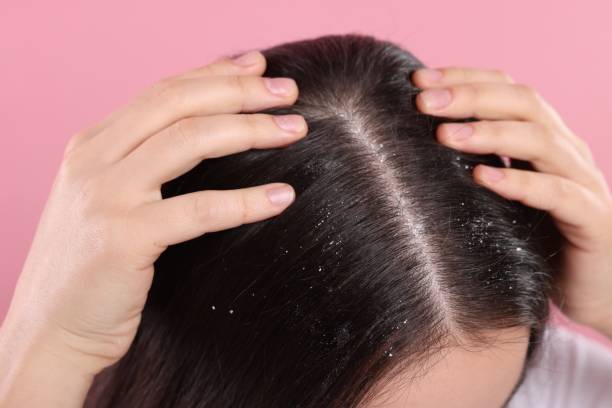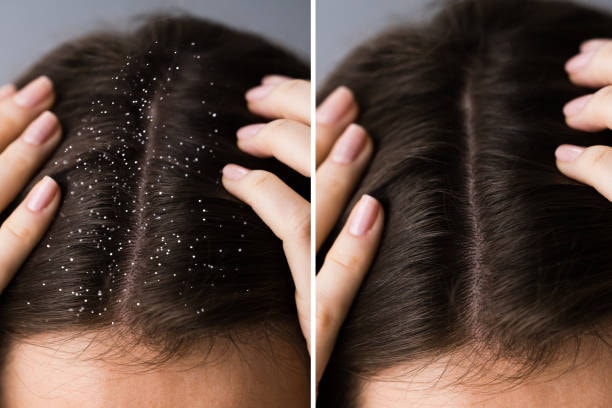
How to Get Rid of Dandruff & Dry Scalp: Home Remedies, Treatments, and Prevention
Time to read 10 min
Time to read 10 min
Table of contents
Dandruff is a common concern irrespective of age and gender across the world. It’s so frustrating to experience dandruff, a flaky scalp, and see flakes on your clothes. Dandruff can be caused by infections, skin conditions, and dietary choices, which can also lead to scalp irritation.
Do you know you have dandruff or dry scalp? Dandruff and dry scalp are both different conditions. Dandruff is a skin condition that affects your scalp and causes flaking, itchy skin, and greasy patches on your scalp. It can be managed with various home remedies, anti-dandruff shampoos, and over-the-counter topical medicines. On the other hand, dry scalp involves drier, smaller flakes accompanied by tightness and itchiness in the scalp, which can trigger dandruff. Dry scalp can be caused by dehydration, dry weather, and harsh chemical hair products.
Wondering how to get rid of dandruff? People who are experiencing dandruff are always seeking dandruff treatment, such as remedies, topical medications, and anti-dandruff products. If you are one of them, this article is for you. This guide will offer effective strategies, including dandruff treatment at home as well as medical treatments, to help you reduce and even permanently get rid of dandruff and dry scalp.
Dandruff is a scalp condition that involves itchy and flaky skin, and it's a kind of mild seborrheic dermatitis. Although dandruff is not a serious problem, it can be persistent, causing embarrassment. Dry scalp also involves itching and flakes.
Dandruff is the shedding of dead skin cells on the scalp, causing visible flakes and itching. It can be caused by oily scalp, seborrheic dermatitis, sensitivity to hair products, scalp psoriasis, and fungal growth on the scalp. Some common symptoms include flakiness, an itchy scalp, and greasy patches on the scalp. Natural home remedies and over-the-counter anti-dandruff products with antifungal properties can offer instant relief from dandruff, reduce it, and prevent it.
Dry scalp is characterized by itching, flaking, and tightness as the scalp lacks adequate moisture. Unlike dandruff, which is caused by excess oil on the scalp, dry scalp is caused by insufficient hydration. It can be caused by dehydration, overwashing of hair, harsh shampoos, and cold weather. Dry weather strips out the moisture from the scalp. Some skin conditions, such as psoriasis and eczema, can also contribute to a dry scalp, making it harder to control itching . Symptoms of dry scalp include an itchy scalp, tightness in the scalp, white flakes, and dry or brittle hair texture.
It is important to identify the scalp condition to determine the right and effective treatment. Various scalp conditions, such as seborrheic dermatitis, dandruff, and fungal infections, can appear like dry scalp but need different treatments. Identifying the accurate condition and underlying causes ensures the right approach for effective treatment and preventing the worsening of the condition. There are many anti-dandruff remedies and dry scalp remedies that can help you get rid of a flaky scalp.
Apart from over-the-counter medications and anti-dandruff shampoos, home remedies can significantly reduce and prevent dandruff. Natural remedies, including olive oil, can moisturize the scalp, reducing flaky skin and fighting against fungi or bacteria, relieving symptoms.
Here are the efficient home remedies for dandruff and dry scalp that you must try:
Apply Cider Vinegar: Apple cider vinegar possesses antimicrobial effects. The acid content can help manage the shedding process of dead skin cells. It also balances the pH of the scalp, reducing the fungal growth, fighting dandruff, and offering relief from scalp psoriasis. Dilute apple cider vinegar in water and rinse your scalp with this. Leave it for around 15 minutes and then rinse with clean water. You can also add a tablespoon of apple cider vinegar to your shampoo or mix it with water and massage your scalp before hair wash.
Tea Tree Oil: Research revealed that tea tree oil can help with dandruff. Tea tree oil possesses antifungal and anti-inflammatory properties that can help ease symptoms associated with skin conditions. The essential oil can help get rid of dandruff by inhibiting the growth of fungus and bacteria on the scalp and fighting inflammation. It is advised to do a patch test, applying a few drops of tea tree oil, certain people may have allergic reactions.
Coconut Oil: It has moisturizing and antimicrobial properties. A small study suggests that coconut oil significantly reduces fungus and bacteria on the scalp. It promotes hydration, prevents fungal growth on the scalp, reduces irritation, and reduces dandruff. Simply rub coconut oil on your scalp before washing. Regular scalp massage with coconut oil improves blood circulation in the scalp and prevents a dry scalp.
Aloe Vera: Aloe vera possesses soothing, healing, and anti-inflammatory properties. Some studies found that aloe vera works great for seborrheic dermatitis. Aloe vera gel comprises many bioactive compounds such as amino acids and antioxidants. It reduces inflammation in the scalp and eases itchiness and other symptoms of dry scalp and dandruff. Simply rub aloe vera gel on your scalp, you can leave it overnight or wash with mild shampoo.
Baking Soda: It can help exfoliate your scalp; however, baking soda should be used with caution. Some studies found that baking soda can help with some skin conditions, such as psoriasis, and it can reduce dandruff. It can be used as a shampoo alternative. Due to its high pH level, it should not be used too frequently as it can damage the scalp. The exfoliating properties help remove dead skin cells, reduce itchiness, and scaling.
Lemon Juice: The acid content of lemon can help maintain pH balance and help with dandruff. Lemon juice may not suit certain people, so use with caution. Just rub some lemon juice on your scalp, let it as it is for 10-15 minutes, and rinse with gentle shampoo and water. You can also rinse your scalp with lemon juice diluted with water.
Dandruff can be managed and treated at home using coconut oil, aloe vera gel, lemon juice, and other natural ingredients. These home remedies for dandruff can soothe your scalp, moisturize it, reduce fungal growth, and reduce symptoms of dandruff, including flaking.
How to remove dandruff with home remedies? If you are also thinking about that, follow these tips sincerely to get the most out of dandruff home remedies.
Home remedies alone may not be as effective if not combined with a balanced diet and stress management. So, eat a healthy diet and manage your stress levels.
Many over-the-counter topical medications and medical treatments are available in the market that can significantly help treat dandruff and dry scalp, easing symptoms, but for severe cases, seeking medical expertise is recommended .
Different anti-dandruff shampoos contain different ingredients that work differently. The key ingredients include salicylic acid, coal tar, ketoconazole, selenium sulfide, and zinc pyrithione. Make sure you use these products well to get the desired results. Gently rub the shampoo on your scalp and leave it for 5 minutes. Rinse thoroughly.
If you have used all-natural home remedies and over-the-counter topical anti-dandruff shampoos and medications for dandruff, but are not getting relief, and are still scratching your scalp, you need professional help. In case you are experiencing severe dandruff accompanied by swelling and redness, seek medical advice from a healthcare professional or dermatologist.
When anti-dandruff shampoos and over-the-counter remedies fail to improve dry scalp and dandruff, you should consider prescription medicine from a medical professional. Common dandruff treatment medicines include fluocinolone.
While looking to prevent dandruff, firstly, keep your scalp clean, use medicated shampoos, a healthy diet, and manage your stress levels. Before jumping to medical options, try using natural remedies as mentioned above. If these remedies fail to ease dandruff and dry scalp, consult a healthcare professional or dermatologist.
Wondering how to remove dandruff permanently? It requires scalp hygiene, healthy lifestyle habits, a balanced diet, and good overall health. Find the right anti-dandruff shampoo for your scalp. Practice regular hair care and hair oiling routine.
If you are experiencing dry scalp, primarily focus on adequate hydration. Hydration is the key to getting rid of dry scalp, as a lack of it can cause the scalp drynes. Use gentle cleansers and nourish your scalp well. Massage your scalp regularly with coconut oil and use moisturizing shampoos and hair care products.
Firstly, you need to recognize that the flaky scalp is due to dandruff or it's dry skin. Identify the cause of a flaky scalp to get the right remedy or treatment. If your scalp has mild flaking, you can try anti-dandruff shampoos, exfoliate your scalp, and massage with natural oils. For a persistent problem, seek professional advice from a dermatologist.
If you have an oily scalp, cleanse your scalp with a mild shampoo, and if you have a dry scalp, look for scalp massages and moisturizing hair care products. You can consider medicated shampoos that contain ingredients such as salicylic acid or zinc pyrithione. If these things don't work for you, consult a professional.
Dandruff is usually a common problem involving an itchy and flaky scalp. It can impact your self-esteem and life quality. However, a healthy, dandruff-free scalp is achievable with the right approaches. First, you need to recognize that you have dandruff or dry scalp, and the root cause of the problem; it will help you find the right approach. If you are using home remedies to get rid of dandruff and dry scalp and maintain a healthy scalp microbiome, be consistent to make the most of these remedies. Not all anti-dandruff natural remedies may work for everyone, so try out all the home remedies to find the one that suits best for your scalp and your particular concern best. If these natural remedies are not able to provide relief and you experience worsening of dandruff, consider professional advice from a dermatologist.
Dandruff is commonly caused by fungal infections that cause flaking, itching, and inflammation. Other causes include dry skin, sensitivity to hair products, seborrheic dermatitis, and stress.
It's quite easy to ignore your scalp under your hair; however, it still requires your attention. A healthy scalp is without any flakes, irritation, itching, dryness, or redness.
Wash your hair regularly, but don’t overdo it. Pick the right shampoo and hair care products that suit your hair type, use scalp exfoliators, and massage your scalp regularly to maintain a healthy scalp.
Coconut oil massage is beneficial for scalp health. Its moisturizing and anti-inflammatory properties offer considerable benefits for the scalp.
Lemon juice is believed to be the best natural ingredient for dandruff. It acts as a natural exfoliator and antiseptic that can help combat dandruff-causing bacteria. The acidic properties of lemon juice balance pH in the scalp, reducing itching and flakiness.
***Medical Disclaimer - The following information is for educational purposes only. No information provided on this website, including text, graphics, and images, is intended as a substitute for professional medical advice. Please consult with your doctor about specific medical advice about your condition(s).
